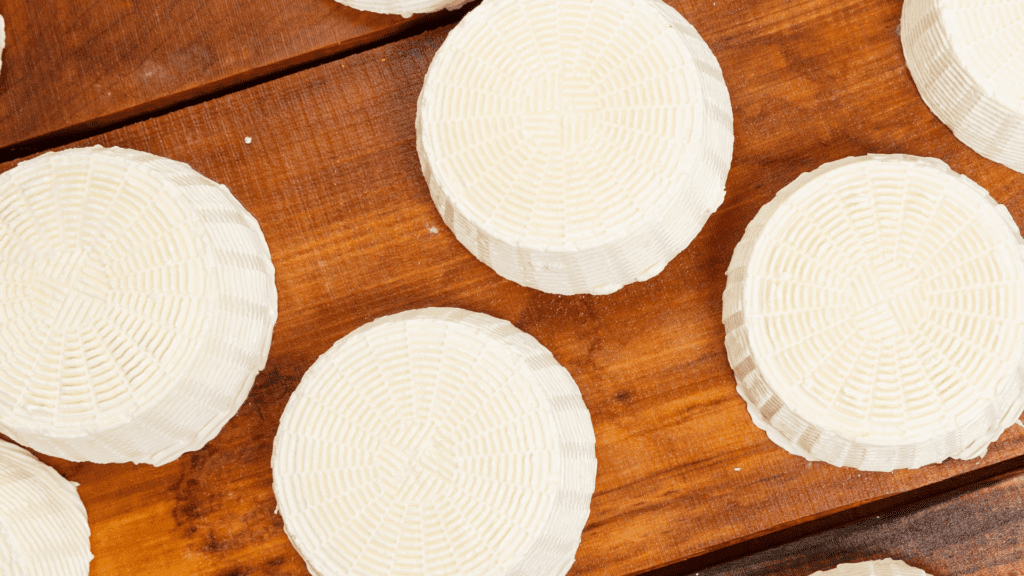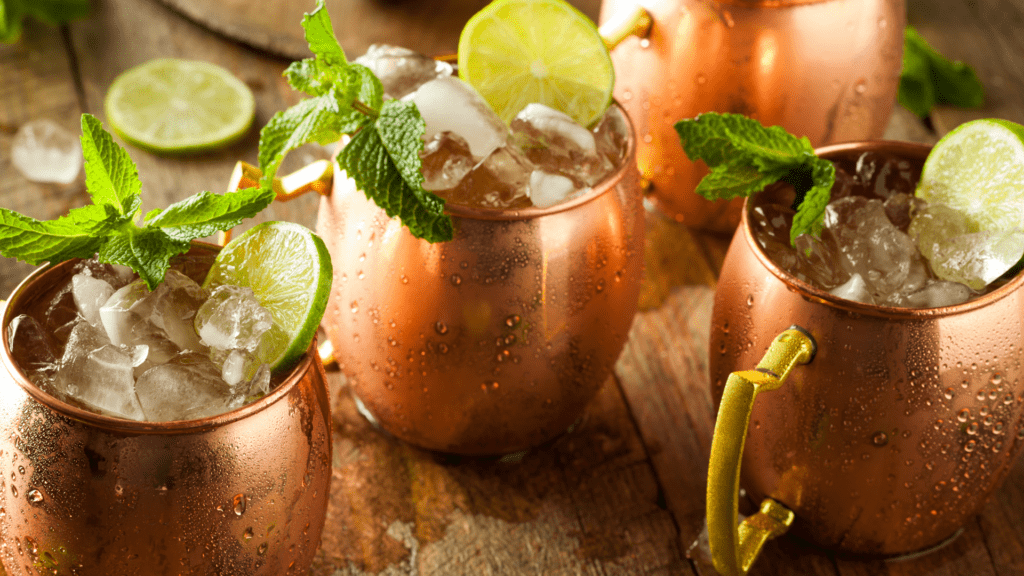READ Moscow Mule and Fresh Goats Cheese: From our Cocktails and Cheese Party (DP1)

Pairing Fresh Goats Cheese with grated ginger and a Moscow Mule
Welcome to tasting notes for pairing a Moscow Mule with Fresh Goats Cheese. Pairing with cocktails is enjoyable, but tricky – cocktails are usually fully bodied and flavored in alcohol, acidity, sweetness and occasionally bitterness such as those with tonic mixers. Cheese is a magical missing ingredient.
Below are tasting notes for the cheese, the cocktail and then comments on how they pair together.
At the bottom of this section are more detailed notes for you to explore the cheese and cocktail more completely.
The Cheese
Your cheese is a ripe brie, creamy throughout the cheese with little or no crumbly centre.
| Body | Creamy with butterfat, goats curd can be moussey or pasty. It becomes softer as it blends with the wine |
| Primary Tastes | Noted for its mild sour, sweet, salty and savoury notes |
| Dairy flavors | Milk and yogurt are common |
| Other flavors | Curd will often show lemony and lactic notes, with some herbs or grass. For artisan cheese there maybe be farm or allium notes |
Spicy Ginger
Goats cheese lovers add flavors. Adding ginger brings a sharpness and texture that forms a bridge to the cocktail without reducing natural flavors of the cheese.

The Cocktail
Your cocktail is a Moscow Mule, dating to early 1950s Los Angeles: vodka, ginger beer, lime.
| Body | Moderate acidity, moderate alcohol (depending on the mixologist), and high fizz make this medium to full bodied drink. |
| Fruit Flavours | Moderate sweetness Strong ginger Lime (juice and slice) |
| Temperature | Serve with ice |
Why should it work?
Remember – everyone is different so you will have your own opinions.
| Strength | Moscow Mule is moderately bodied: the cheese is lightly bodied, but given extra weight by the spicy ginger. |
| Balance | The alcohol and sweetness of the Mule compliment the savory, salty, acidity of the cheese. |
| Harmony | Ginger echoes the dominant flavor of the Mule. The lemon in the cheese meets the lime in the Mule. The cheese’s soft cream notes are amplified by the ginger. |
| Texture | The cheese thickens the sparkling cocktail giving a creamy almost sorbet like combination. The grated ginger add a fibrousness and a short concentrated ginger spark when chewed. |
| Provenance | None! Goats cheese is 8,000 years old and the Mule is a 20th Century confection invented to sell Vodka. The match arises as both are made from simple unprocessed ingredients with crystal clear flavors. And maybe, if you squint the white cheese with ginger flecks, it looks like sun glinting off snowy Moscow spires in winter. |
More About the Cheese

Goats curd is soft, white and generally moist and light in texture. When spread it maybe become a little fluffly.
Oldest Cheese in the World: Fresh goat’s curd is considered one of the oldest cheeses in the world, with a history that traces back 8 thousand years ago when sheep, goats and cows were first domesticated. It is believed to have originated in the eastern Mediterranean and Persia, regions associated with the first settled agriculture in the regions surrounding Mediterranean Sea.
Simply Made – No Ripening, Curing, or Maturation: Fresh goat’s curd is prized for its simplicity in production. It undergoes minimal processing compared to other cheese varieties. After the goat’s milk is curdled and separated, the resulting curds are drained and typically served immediately, without the need for ripening, curing, or maturation. This lack of aging allows the cheese to retain its fresh and creamy qualities, making it a straightforward and pure expression of dairy nutrition.

Traditionally goats curd had a a very short shelf life, but with pasteurization, refrigeration, and modern packaging good curd can last for weeks and sometimes months.
Very Flexible: Fresh goat’s curd is highly versatile in the culinary world. Its mild, tangy flavor and creamy texture make it an ideal ingredient for a wide range of dishes, both savory and sweet. It can be used in salads, spreads, dips, desserts, and more. Its flexibility in the kitchen allows chefs and home cooks to experiment with various flavor combinations and applications, making it a cherished ingredient in many culinary traditions around the world.
Under-Rated: this cheese is rarely used on cheeseboards, which under rates it. When matched with accompaniments as diverse as honey, walnuts, figs, peppercorns or herbs, it gives strong, inviting yet fresh flavors to enjoy at any time.
More About the Moscow Mule

What is a Moscow Mule?
- 2 oz/60ml vodka
- ½ oz/15ml fresh lime juice
- 4-6 oz/120-180ml. (½ a can) chilled ginger beer
- 1 lime wedge
What glass should you use? A Copper Mug is the original, purely for marketing reasons, making copper mugs a little known trend of the 1960s despite the Beatles’ message that Love is all you need. You should go for it if you have one on hand (who doesn’t?). Otherwise go for a theatrical glass of choice. As the Mule can be a good long drink, pint glasses are not unknown.
The History of The Mule
The Mule is not from Moscow, it is a purely American invention, dating from the early-mid 20th century. It is known for its refreshing and tangy flavor, typically served in a distinctive copper mug. The cocktail’s history involves a combination of ingredients and marketing efforts that contributed to its popularity.
Said to have been created during the Second World War, by Rudolph Kunett president of Smirnoff Vodka, Jack Morgan the owner of the Cock ‘n’ Bull pub in Los Angeles, and John G. Martin a liquor distributor. It was probably named for Moscow as vodka was little known in the US then. The memorably alliterative Mule was almost certainly due to the kick it gives.
The Moscow Mule gained popularity in the United States during the 1950s and 1960s. The Moscow Mule remains a popular cocktail in bars and restaurants worldwide.
It is appreciated for its:
- simple and widely liked flavors
- not being excessively sweet
- flexibility – it can be a short blunt drink or a longer summer refresher
Most of all though it’s both easy to make from easily available ingredients, and can be cooked up with high quality vodka and fresh ginger to provide a superior spicy sparkling eye-winker.
Party As If You Are Making It Up As You Go Along
The Mule, like Santa’s red suit, is a modern marketing confection. Yet somehow, like Santa’s suit, it sparks the imagination and hits the happy spot. Pairing it with the oldest cheese in the world spiced with one of herbal medicine’s staples wont guarantee less of a hangover, but it does show the old and the new can party together as good as any.